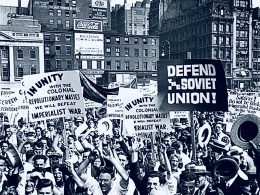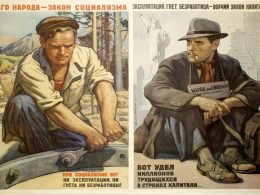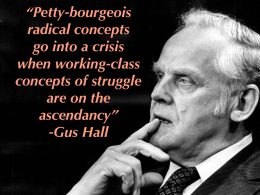As usual when it comes to class analysis, the question of the lumpenproletariat (the element which has been pushed to the economic periphery) in the United States has a dual nature. Because the lumpen are a class that’s at the same time especially susceptible to becoming forces for reactionary intrigue, and that’s gaining increasing amounts of revolutionary potential. As Marx and Engels warned about the lumpen—which in their time specifically meant the criminal class—there are counterrevolutionary tendencies within it which the bourgeoisie can exploit. Gangs are military governments that seek access to the black market under capitalism, making them unreliable entities as far as proletarian revolution is concerned. And the social conditioning of individualism, patriarchy, and violence under capitalism can make many within this criminal element enamored with backwards habits, which they aren’t all willing to unlearn.
Yet because the collapse of the economy under late-stage capitalism and U.S. imperial decay are pushing ever more people out of the workforce, making the lumpen a growing class, they’re now (numerically speaking) a class with growing revolutionary potential. Their detachment from the means of production still makes them lack the ability to wield the economic leverage which the proletariat wields; as Lenin said, the proletariat is the only class that can unite the masses against the forces of reaction. So the tasks of building a vanguard, and of depriving the bourgeoisie of control over the productive forces, can still only be filled by the proletariat. But as Stalin observed, “the point is not which class today constitutes the majority, or which class is poorer, but which class is gaining strength and which is decaying.” Because the lumpen are gaining strength, bringing them into the revolution is an urgent priority for U.S. communists.
By this, I don’t mean recruiting gang members into our organizations, either active or semi-active. Their affiliation with self-interested military regimes poses a conflict of interests for them, and gang ideology is incompatible with scientific socialism due to its idealist character. Nor do I mean enabling individual lumpenproles, gang affiliated or otherwise, who refuse to give up their reactionary tendencies. I mean building relationships with the majority of the lumpen who are compatible with organizing, as opposed to the tiny minority of the lumpen who are gang members. Showcasing how the term “lumpenproletariat” has expanded its descriptive reach since the time of Marx and Engels, the majority of the lumpen today are women, victims of economic pressures that get exacerbated by sexism. This reality is vital to understand whenever discussing the lumpen, who get portrayed as being represented by their macho, mafioso minority elements. As journalist Eleanor Goldfield wrote in January of last year:
You may have heard that the economy lost 140,000 jobs in December. What may have flown under the radar is the fact that men actually gained 16,000 jobs, while women lost 156,000. 154,000 of those were black women. This is vital information. In a nation so sharply cut along race and gender lines, you can’t have a legitimate conversation about policy without considering these facts. Not to mention the facts as to why these women lost their jobs: because they had to care for children? Because they got sick? Because their workplaces closed? We can’t talk about policy without considering these questions.
Has these people’s being forced out of their proletarian status suddenly made them incompatible with the revolution? On the contrary, it’s merely given them a different type of revolutionary potential. The type of potential that Mao recognized in his country’s lumpen masses before he successfully rallied them to assist in China’s revolution, then proletarianized them.
In the face of this shrinking of the proletariat that the capitalist state’s response to the pandemic is creating, where we’re seeing disproportionately female and nonwhite workers become victims of a collapsing system, the task of communists is not to fetishize the existence of the lumpen. It’s to provide the lumpen with the resources and outlets to escape their disempowerment, and ultimately to give them jobs after the revolution succeeds. In other words, to begin the steps towards proletarianizing the lumpen. The first step towards this is creating the kinds of networks for serving poor people’s material needs that Goldfield described:
In response to this unstable and complex landscape, local and industry-specific mutual aid organizations work to provide information, application assistance, and day-to-day support to the many who fall through the cracks. Make the Road New York and Queens Care Collective are two local New York City organizations that have walked people through how they might access and apply for benefits. They’ve also been raising funds and collecting supplies for folks in the community. Similarly, One Fair Wage has offered cash grants and support to service industry workers regardless of status, a vital service when so many are precluded from unemployment benefits due to their immigration status. Service Workers Coalition does the same, helping folks with utility payments and food delivery as well.
These are the kinds of things communists must prioritize in order to unite the proletariat with the lumpen. Just as important is the development of a militancy culture within our cadres. Arm up, create workout routines, and study martial arts. Serving the needs of marginalized communities means not just aiding them amid economic deprivation, but defending them from rising fascist violence. As Huey Newton said, “To recruit any sizeable number of street brothers, we would obviously have to do more than talk. We needed to give practical applications of our theory, show them that we were not afraid of weapons and not afraid of death. The way we finally won the brothers over was by patrolling the police with arms.”
If someone is white like me, they should try to reach out to their own demographic, rather than going with guns into a hood environment that they don’t understand. But communists of all colors should absolutely engage in militancy training so that when the conditions demand it of us, we can put that training into practice. Should we be prompted to protect our communities from fascist violence, or to join in on the kinds of scenarios which Che Guevara describes in his works on Guerrilla Warfare, we must be prepared to fill the roles appropriate for us. If our cadres fulfill these tasks in addition to the mutual aid aspect, we’ll prove ourselves allies of the lumpen’s war against capitalist and colonialist injustice. We’ll gain credibility among the masses of recently unemployed members of America’s internal colonies, and among the members of these colonies who’ve been forced out of employment by the carceral state.
It’s the latter category that will be instrumental when it comes to overthrowing the state, and the former category that will be instrumental when it comes to providing the social base for this overthrow effort. When our revolutionary crisis reaches its pivotal moment, the proletariat will carry out the strikes which render the state paralyzed, the lumpen masses will largely help provide networks supporting the revolutionary insurgency, and the insurgency itself will be led by the lumpen who’ve been dispossessed by the mass incarceration system. Or at least this is how the alliance between the classes will go if communists manage to sufficiently build it in time.
I say that lumpenproles who are felons will lead the insurgency effort because there’s sociological evidence that these felons, who face state monitoring and challenges in finding a job due to their criminal records, will join a revolt against the state sometime during our generation. They have nothing left to lose, and their disproportionately being Black, Brown, and Indigenous people makes them also belong to communities which are especially targeted by police brutality. As the settler police state grows ever more militarized and deadly, this social tinderbox among the colonized lumpen gets constantly more likely to become inflamed. If poverty and state violence keep getting worse for these communities, which they will as long as the United States continues to exist, we could eventually see a popular insurgency, with police brutality as likely its central motivating issue in the initial stage. As the revolt goes on, and gains the support of more of the masses, it will expand into an effort to liberate the masses from the USA’s other mounting contradictions.
The emergence of such a revolt is inevitable, given the deteriorating conditions of the U.S. empire’s internal colonies. The question is whether or not when it happens, communists will have built the community alliances, mass educational programs, and trained cadres necessary to steer it towards revolution. Trusting in spontaneous revolts is as unwise as trusting in “the lumpen” without a clear program to bring the lumpen into the revolution. As Lenin wrote, “Why does the spontaneous movement, the movement along the line of least resistance, lead to the domination of bourgeois ideology? For the simple reason that bourgeois ideology is far older in origin than socialist ideology, that it is more fully developed.”
The lumpen have been deprived of the resources to overcome this bourgeois ideology, with its individualist and idealist nature. It’s therefore the task of the proletarian revolution’s cadres to educate the lumpen and the other elements of the masses, to give them the theoretical knowledge required for carrying through their coming revolts into an actual revolution. It’s our duty to provide for their material needs, and to train ourselves for the prospect of militant struggle, whether this struggle has to be defensive or guerrilla in nature. If we fulfill these demands, we’ll overcome the growing fascist reaction, and construct a post-colonial federation of socialist nations in the place of the United States.
—————————————————————————
If you appreciate my work, I hope you become a one-time or regular donor to my Patreon account. Like most of us, I’m feeling the economic pinch during late-stage capitalism, and I need money to keep fighting for a new system that works for all of us. Go to my Patreon here.








